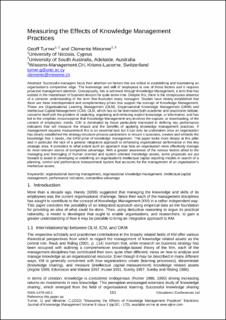Please use this identifier to cite or link to this item:
https://doi.org/10.21256/zhaw-3959Full metadata record
| DC Field | Value | Language |
|---|---|---|
| dc.contributor.author | Turner, Geoff | - |
| dc.contributor.author | Minonne, Clemente | - |
| dc.date.accessioned | 2018-08-29T14:06:42Z | - |
| dc.date.available | 2018-08-29T14:06:42Z | - |
| dc.date.issued | 2010 | - |
| dc.identifier.issn | 1479-4411 | de_CH |
| dc.identifier.uri | https://digitalcollection.zhaw.ch/handle/11475/9922 | - |
| dc.description.abstract | Successful managers focus their attention on factors that are critical in establishing and maintaining an organisation’s competitive edge. The knowledge and skill of employees is one of those factors and it requires proactive management attention. Conceptually, this is achieved through Knowledge Management, a term that has existed in the mainstream of business lexicon for quite some time. Despite this, there is the conspicuous Absence of a common understanding of the term that frustrates many managers. Studies have clearly established that there are three interdependent and complementary pillars that support the concept of Knowledge Management. These are Organisational Learning Management (OLM), Organisational Knowledge Management (OKM) and Intellectual Capital Management (ICM). OLM, which has so far dominated both academic and practitioner debate, concerns itself with the problem of capturing, organising and retrieving explicit knowledge, or information, and has led to the simplistic misconception that Knowledge Management only involves the capture, or downloading, of the content of employees’ minds. ICM is dominated by those particularly interested in defining key Performance indicators that will measure the impact and the benefits of applying knowledge management practices. If management requires measurement this is an essential task but it can only be undertaken once an organisation has clearly established the strategy-structure-process parameters to ensure it accesses, creates and embeds the knowledge that it needs...the OKM pillar of knowledge management. This paper looks more deeply at this pillar and in particular the lack of a general integrative approach to enhancing organisational performance in this key strategic area. It considers to what extent such an approach may help an organisation more effectively manage its most relevant source of competitive advantage. With a greater awareness of the various factors allied to the managing and leveraging of human oriented and system oriented knowledge assets, some proposals are put forward to assist in developing or redefining an organisation’s intellectual capital reporting models in search of a planning, control and performance measurement system that accounts for the management of an organisation's intellectual assets. | de_CH |
| dc.language.iso | en | de_CH |
| dc.publisher | Academic Conferences and Publishing International Limited | de_CH |
| dc.relation.ispartof | Electronic Journal of Knowledge Management | de_CH |
| dc.rights | http://creativecommons.org/licenses/by-nc-nd/4.0/ | de_CH |
| dc.subject | Organisational knowledge management | de_CH |
| dc.subject | Performance management | de_CH |
| dc.subject.ddc | 658.4: Leitendes Management | de_CH |
| dc.title | Measuring the effects of knowledge management practices | de_CH |
| dc.type | Beitrag in wissenschaftlicher Zeitschrift | de_CH |
| dcterms.type | Text | de_CH |
| zhaw.departement | School of Management and Law | de_CH |
| zhaw.organisationalunit | Institut für Wirtschaftsinformatik (IWI) | de_CH |
| dc.identifier.doi | 10.21256/zhaw-3959 | - |
| zhaw.funding.eu | No | de_CH |
| zhaw.issue | 1 | de_CH |
| zhaw.originated.zhaw | Yes | de_CH |
| zhaw.pages.end | 170 | de_CH |
| zhaw.pages.start | 161 | de_CH |
| zhaw.publication.status | publishedVersion | de_CH |
| zhaw.volume | 8 | de_CH |
| zhaw.publication.review | Peer review (Publikation) | de_CH |
| Appears in collections: | Publikationen School of Management and Law | |
Files in This Item:
| File | Description | Size | Format | |
|---|---|---|---|---|
| Measuring the Effects of Knowledge Management_minonne-1.pdf | 109.68 kB | Adobe PDF |  View/Open |
Show simple item record
Turner, G., & Minonne, C. (2010). Measuring the effects of knowledge management practices. Electronic Journal of Knowledge Management, 8(1), 161–170. https://doi.org/10.21256/zhaw-3959
Turner, G. and Minonne, C. (2010) ‘Measuring the effects of knowledge management practices’, Electronic Journal of Knowledge Management, 8(1), pp. 161–170. Available at: https://doi.org/10.21256/zhaw-3959.
G. Turner and C. Minonne, “Measuring the effects of knowledge management practices,” Electronic Journal of Knowledge Management, vol. 8, no. 1, pp. 161–170, 2010, doi: 10.21256/zhaw-3959.
TURNER, Geoff und Clemente MINONNE, 2010. Measuring the effects of knowledge management practices. Electronic Journal of Knowledge Management. 2010. Bd. 8, Nr. 1, S. 161–170. DOI 10.21256/zhaw-3959
Turner, Geoff, and Clemente Minonne. 2010. “Measuring the Effects of Knowledge Management Practices.” Electronic Journal of Knowledge Management 8 (1): 161–70. https://doi.org/10.21256/zhaw-3959.
Turner, Geoff, and Clemente Minonne. “Measuring the Effects of Knowledge Management Practices.” Electronic Journal of Knowledge Management, vol. 8, no. 1, 2010, pp. 161–70, https://doi.org/10.21256/zhaw-3959.
Items in DSpace are protected by copyright, with all rights reserved, unless otherwise indicated.